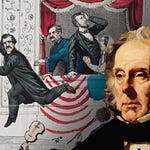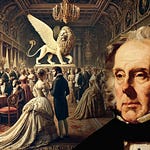Episode 03 - The Venetian Takeover of England: A 200-Year Project
Episode 05 - Bestial British Intelligence Of Shelburne and Bentham
Episode 07 - Palmerston Launches Young Turks to Permanently Control the Middle East
Episode 09 - Jim Crow, a Cultural Weapon in the Hands of the Confederacy
The foundation of British imperial power and intelligence traces back to an influential cabal led by Lord Shelburne and his protégé, Jeremy Bentham. Their impact on the world emerged through strategies crafted for subversion, destabilization, and manipulation. Through philosophical radicalism, brutal pragmatism, and an unwavering devotion to British dominance, Shelburne and Bentham transformed the landscape of global intelligence, turning Britain into a hub of imperial control that relied on economic manipulation and political destabilization rather than sheer military force.
This expanded analysis dives deeply into their strategies, exploring their dismantling of American independence, intervention in the French Revolution, and the construction of a British intelligence network that remains influential. Through utilitarianism and free trade, Bentham and Shelburne forged new means to control and exploit, marking a dark epoch in the annals of British statecraft.
📜 Foundations of British Imperial Philosophy
The path to British imperial philosophy starts with British empiricism, which borrowed heavily from Venetian thinkers like Paolo Sarpi and Paul Paruta. Sarpi’s skepticism about truth and reliance on state power influenced British thinkers from Francis Bacon to Thomas Hobbes and John Locke. Bacon’s inductive method introduced the concept of sense-based reasoning, establishing the basis for an empirical approach to knowledge. Locke’s tabula rasa presented human minds as blank slates to be filled only by sensory experience. Stripped of moral ideals, empiricism became the bedrock for British imperialism, offering a cold, calculated means to control minds and societies.
Bentham inherited this radical empiricism and pushed it into moral nihilism, where human life was reduced to the calculus of pleasure and pain. Bentham’s work epitomized the concept of humans as slaves to instinct and sensation, rejecting morality and elevating hedonism as the only guiding principle.
🏛 Bentham’s Critique of American Ideals
Bentham’s contempt for American independence echoed this hedonistic framework. In 1776, he dismissed the Declaration of Independence as “fanatical” for its belief in unalienable rights. The Americans, he argued, were blind to the reality that all government inevitably infringes on these so-called rights. The American struggle for freedom and autonomy was, to Bentham, a futile exercise that contradicted nature’s ‘laws’ of pain and pleasure.
Shelburne, equally contemptuous of the American experiment, saw an opportunity to subdue the new republic not through war, but through economic ruin. He deployed a devastating free trade agenda, intended to destabilize America financially. Indeed, the British battle cry became “destroy America with free trade,” a sentiment calculated to subtly infiltrate and weaken the newly formed union by exploiting its commercial vulnerabilities.
🔥 The Jacobin Terror: A British Orchestration
With American colonies in turmoil, Shelburne shifted focus to France, envisioning a dismantling of French power. The Jacobin Terror, remembered as one of history’s bloodiest revolutionary movements, did not erupt spontaneously—it was carefully staged by British intelligence. British-funded agents ignited the revolution from within. In a calculated move, Shelburne’s allies positioned key actors in France, including the Swiss banker Jacques Necker and the Duke of Orléans, to push France toward chaos. Necker’s fiscal policies drained the French treasury, plunging the nation into economic crisis and preparing the ground for political collapse.
Shelburne and Bentham created a “writers’ shop” at Bowood to manufacture incendiary revolutionary rhetoric. Bentham himself, along with allies like Etienne Dumont and Samuel Romilly, scripted fiery speeches that would later be delivered by Marat, Danton, and Robespierre, leaders of the Terror. These rhetorical bombs incited the masses and destabilized the monarchy, bringing France to the brink.
🕵️ Building the British Intelligence Apparatus
As the ideological groundwork laid by British empiricism unfolded, Shelburne forged an extensive intelligence network. From his seat in the East India Company, he coordinated covert actions and propaganda designed to weaken Britain’s foes. He centralized intelligence operations, bringing espionage under the Foreign Ministry’s jurisdiction, crafting a formalized British intelligence system that influenced both domestic and foreign policy.
This network’s effectiveness depended on its ability to manipulate ideology, economics, and psychology. Through the East India Company’s global reach, intelligence operations targeted economic structures in British territories, America, and European nations. Shelburne’s intelligence network shifted the nature of power, making subversion and destabilization fundamental tools of British foreign policy.
🧠 Bentham’s Panopticon: Control Through Surveillance
In his drive to impose control, Bentham devised the Panopticon, a prison design that represented a chilling new mode of power. Conceived during his visit to Russia, where he advised Prince Potemkin on labor solutions, the Panopticon was meant as a tool for social control. It featured a central surveillance tower from which a single guard could monitor inmates without their knowledge, effectively controlling behavior through constant psychological pressure.
Bentham saw this design not merely as a prison model, but as an ideal framework for broader social management. The Panopticon embodied Bentham’s philosophy of control, creating a system in which people could be molded by unseen forces, their lives regulated without their awareness.
⚖️ The Political Manipulation of Free Trade
Shelburne’s promotion of free trade was a tactic to undermine other nations’ economies. While British manufacturers profited from tariff-free goods, newly independent nations found themselves unable to compete, economically dependent on Britain. Shelburne’s infamous 1783 speech before the House of Lords solidified free trade as a weapon: “Let every market be open,” he declared, knowing that Britain’s industrial power would suffocate weaker economies.
This approach nearly bankrupted the fledgling American republic, necessitating the Federalist push for a robust federal constitution in 1787. Without this protective economic framework, America might have fallen back under British influence. As Alexander Hamilton observed, America’s survival required economic policies that safeguarded its independence against Britain’s economic onslaught.
🔥 The Legacy of Philosophical Radicalism
Bentham’s circle of philosophical radicals expanded his ideas, influencing future thinkers and activists. Figures like James Mill and his son John Stuart Mill embraced Bentham’s hedonism, rejecting religion and morality in favor of utilitarian pragmatism. Bentham’s protégé, Thomas Carlyle, authored the official British history of the French Revolution, sanitizing Britain’s role in orchestrating the bloodshed. Even Karl Marx fell under Benthamite influence through the agent David Urquhart, a Benthamite who cultivated radical thought within Britain’s ideological apparatus.
Bentham’s disdain for morality, combined with his insistence on psychological manipulation, cemented a brutal strain of utilitarianism. Through his protégés, his influence reached the farthest corners of British foreign policy, blending espionage, economic domination, and social control.
📖 Epilogue: A Lasting Influence on Imperial Power
Upon his death, Bentham’s body was preserved and displayed, symbolic of his undying influence. His mummified form sat in a glass case, an ever-present witness at meetings of Britain’s radical thinkers, epitomizing a legacy of utilitarianism and control that lives on in the machinery of British imperialism. Shelburne and Bentham, through free trade, destabilization, and subversion, crafted a template for British imperial policy that would echo through the ages, setting standards for global intelligence and covert influence that persist into the modern era.
Bentham’s legacy, a paradoxical blend of hedonism and social engineering, continues to haunt the philosophies of statecraft and intelligence. The lessons of Shelburne and Bentham remind us that imperial power need not rely solely on arms; it can be constructed through the subtlest manipulations of human behavior, economies, and ideologies, leaving an indelible mark on the world stage.
Timeline of Events: The Bestial British Intelligence of Shelburne and Bentham
1600s-1700s - The foundation of British empiricism is laid by Francis Bacon, Thomas Hobbes, and John Locke, with Locke’s ideas of human nature as hedonistic and driven by sensory experience shaping British imperialism’s philosophical basis.
1763 - Lord Shelburne commissions Adam Smith to write The Wealth of Nations to support his vision of free trade. This doctrine of open markets is set to become a tool for Britain’s economic strategy against emerging powers, including the United States.
1776 - Jeremy Bentham publishes a condemnation of the American Declaration of Independence, describing it as “fanatical” for its support of inherent rights and human freedom. Bentham’s views reject traditional freedoms in favor of hedonism and utilitarianism.
1780 - The Gordon Riots erupt in London, orchestrated and funded by Shelburne through the East India Company, as a tactic to undermine Irish reforms and destabilize Shelburne’s opponents. This violent uprising clears his political path, securing his influence.
1782-1783 - Shelburne briefly serves as Prime Minister, during which he secures the Treaty of Paris, formally ending the American Revolution. He uses this opportunity to push for free trade with America, intending to weaken the republic economically.
1785 - Bentham publishes In Defense of Usury, advocating the removal of all limits on interest rates to promote “invention,” marking a significant shift toward unrestrained capitalism within British policy.
1787 - Bentham designs the Panopticon, a prison model that embodies his views on social control through surveillance. Conceived in Russia, the design allows a single guard to monitor inmates, symbolizing Bentham’s vision for managing society through unseen oversight.
1791-1793 - The Jacobin Terror, influenced by British intelligence, devastates France. British-backed agents fuel revolutionary fervor, orchestrating violent upheaval to dismantle French power and weaken its monarchy. This British intervention is central to the Terror.
1792 - Bentham is honored with French citizenship, declaring loyalty to the revolutionary cause while promoting British influence in France. His alignment with the revolutionaries reflects his dedication to radical change, albeit for British ends.
Early 1800s - Bentham’s ideas gain traction as his followers, including James Mill and John Stuart Mill, embed his philosophies in British policy. His radical utilitarianism shapes British intelligence strategies, influencing statecraft and espionage.
1832 - Bentham dies, and his body is preserved and displayed, symbolizing the lasting impact of his ideas. His mummified form at University College London serves as a haunting reminder of his philosophical legacy.
Palmerston’s Zoo Series
For the past 30 years, media and academia have largely ignored the groundbreaking lectures presented at the President's Day 1994 Schiller Institute and International Caucus of Labor Committees conference. Yet, they contain some of the most vital historical insights for anyone seeking to understand the forces shaping today's world. "Palmerston's Zoo" is a deep exploration into the intricate workings of British imperialism—revealing the key figures, strategies, and philosophies behind its shadowy influence over global politics. This series brings together eight distinct but interwoven narratives that expose the power structures, manipulations, and covert operations that have determined the course of world history.
The Duke Report presents this podcast as an opportunity to breathe new life into these timeless analyses, giving listeners a comprehensive perspective connecting past imperial strategies and present-day geopolitics. The impact of these lectures is staggering, providing crucial context for understanding current events—a context that has never been widely disseminated through mainstream academic or media channels. The insights offered here are not just historical; they are the key to unlocking the deeper narrative of how global influence operates, making this possibly the most important history lesson for 21st-century humans. Join us on a journey that defies conventional narratives, challenges accepted truths and provides an essential map to navigate the complexities of modern power.
Links to authors and sources:
Let me know if anyone has been left out













Share this post